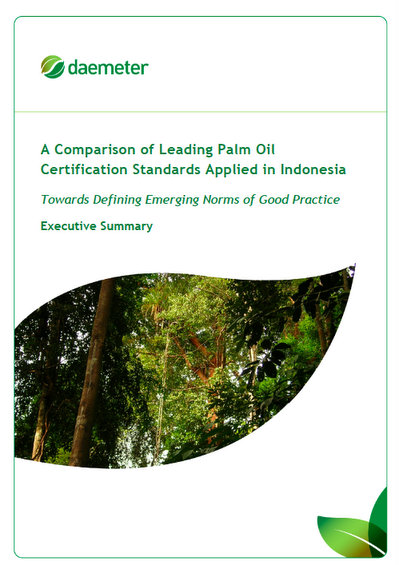
Executive summary of a comparison of leading palm oil certification standards applied in Indonesia: towards defining emerging norms of good practice
Authors: Yaap, B., Paoli, G.
Publisher: Daemeter Consulting
Feb 2014
Indonesia’s regulatory framework governing palm oil is comprehensive in scope and complex in form. In a bid to strengthen enforcement of this framework, in 2011 Indonesia’s Ministry of Agriculture decreed the mandatory Indonesian Sustainable Palm Oil (ISPO) standard. Under ISPO, all producers must bring operations into compliance with the standard by 2014, or face risk of losing their license to operate.
The emergence of ISPO to complement existing third-party certification schemes has invigorated discussions about “legality” vs "sustainability" of palm oil in Indonesia. These discussions are sometimes contentious, with stakeholder groups tending to galvanize around one sustainability standard over others, often at the expense of understanding commonalities among them, and the shared challenges they face.
As a contribution to growing discussion around the roles of certification versus legal compliance in promoting sustainable palm oil, Daemeter conducted a study comparing criteria of four leading
sustainabily standards:
♦ Roundtable on Sustainable Palm Oil (RSPO)
♦ Indonesian Sustainable Palm Oil (ISPO)
♦ International Standard for Carbon Certification (ISCC)
♦ Sustainable Agriculture Network (SAN)
The review presents a structured, in-depth comparison of environmental and social requirements of each standard, highlighting areas of commonality and difference, and drawing attention to where Indonesia’s regulatory system supports or presents challenges to compliance with sustainability criteria. The aim of the study is to support future efforts at shaping a consensus definition of legal and sustainable palm oil, by (a) describing emerging “norms of good practice” embodied in certification schemes and (b) providing context to benchmark Indonesia’s regulatory framework. In this way, the report can be seen as a background document to inform future multi-stakeholder discussions to mainstream sustainability and harmonize certification approaches, especially ongoing cooperation between RSPO and ISPO to provide mutual support.
The full report will be available for download in early March.

